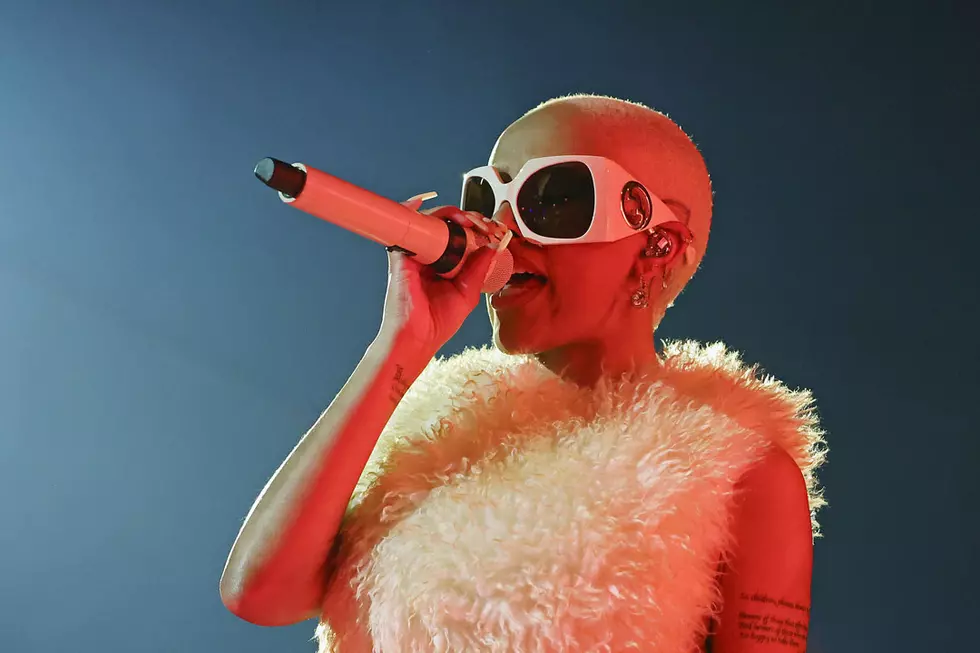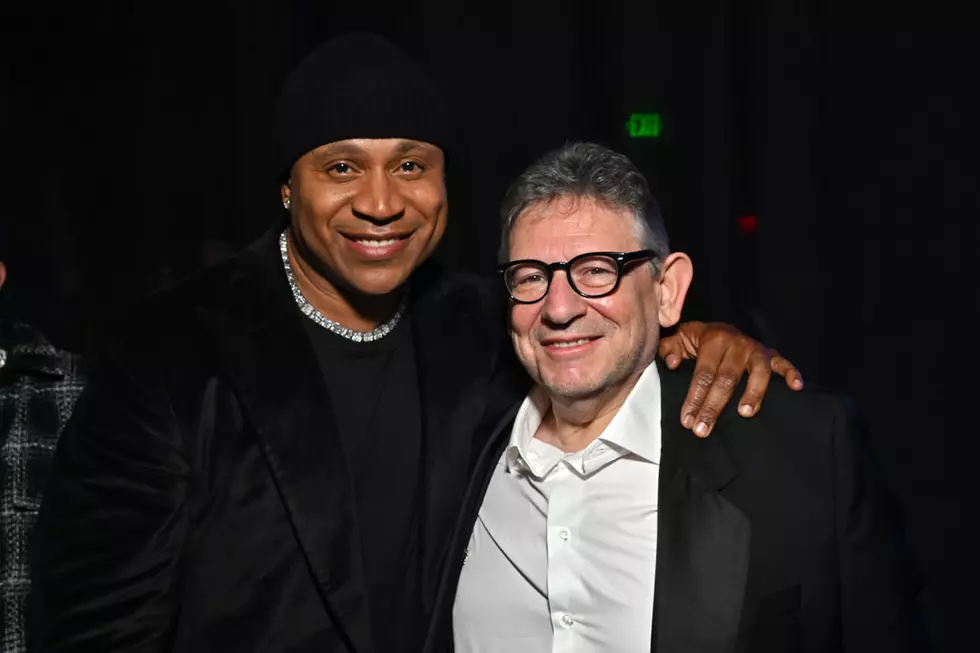
Studio Session: Why Producer J. Reid Channeled Boom-Bap for Nicki Minaj’s New Singles
No one knew quite what to expect last week when Nicki Minaj teased two new singles, “Chun-Li” and “Barbie Tingz,” offering no hints beyond the provocative (and in the case of the latter, Victorian) cover artworks. The comeback records—her first solo releases since dropping a three-song pack last March that included “No Frauds”—are sonically built on slapping percussion and sparse soundbeds. They’re open enough for Nicki to get her bars off à la her early mixtape days that first gave the rap world a glimpse at just how nice she is on the mic. (Appropriately, both songs dropped on the 10-year anniversary of her second mixtape, the Lil Wayne-hosted Sucka Free.)
Nicki looked to an unlikely source to deliver the type of boom-bap flavored beats that are reminiscent of New York City hip-hop: a rising Atlanta producer named J. Reid of Chevi Muzic. The 31-year-old Decatur, Ga. native linked with Nicki back in December, and after a couple of fruitful sessions, signed a deal to join her as-yet-unnamed label imprint. While his catalog includes production work for Southern stars like Lil Boosie (“Show the World”), Lloyd (“Heavenly Body” with Rick Ross, “Holding” with Lil Wayne) and Moneybagg Yo (“Have You Eva”), his heart pumps for the NYC sounds of the early aughts—Dipset and G-Unit.
“That shit give me chills—I love that music,” the man born Jeremy Reid tells XXL via the phone, just hours after Nicki unveiled her new tracks. “I was just listening to Get Rich or Die Tryin' because that shit is a staple in hip-hop history. But why don't nobody go back and sample 50 [Cent]? I feel like if don't nobody else do it, I'll fuck around and do it. I'm not playing. I’m here to take over.”
J. Reid sat down with XXL to speak on how he helped Nicki Minaj return to rap with a vengeance.
XXL: How did you first link up with Nicki Minaj to record "Chun-Li" and "Barbie Tingz"?
J. Reid: One of my partners—Brinx Billions—was working with Nicki. He did a record with her and it was so crazy that she was like, “Who did the beat?” He told her that I did it and she was like, “We might need to fly him out here.” My first trip to meet her was Miami. I went out there so excited. She was just like, “I love your music. You're talented, I'm just trying to put some stuff together.” So I was like, “I'm ready.” From that, it's just been ballgame. Coming back and forth, going in and out of town, working at home and showing out.
When did that meeting happen in Miami?
It was probably late December. Everything came to fruition around that time. She was looking to start her project—she probably had already started it. But the certain sound she wanted, I was able to cater.
What was it like once you got into the studio with Nicki? Did she give you much direction?
My first actual session with her wasn't until I got to Cali. Interacting with her in a session is different than just talking with somebody in a meeting—now you got both creators talking and expressing how they feel and what they want. She definitely had a song in her mind. She was like, “I need you to do a beat for me that's something like this.” I'm talking about "Barbie Tingz." She said she wanted me to do some boom-bap beats. I'm from the South—we do trap. That's what I’m used to doing, but I was in band from sixth grade to 12th grade, and I played drums. So I was able to adapt to anything that she wanted to do, because I have a good knowledge about music, music science, music history, all that stuff.
For her to pick “Barbie Tingz,” I did 15 different beats. I went to a separate studio to work. She called me back in the room—I didn't even get to play all 15 beats. I played one beat, [then] I played the second beat and she was like, “Stop, pull it up, I'm about to go in.” I'm like, “This is crazy. Is she really finna go rap on my beat, like, freestyle?!” And went crazy.
What was it like to watch her recording process? Did anything stand out?
I was just so stunned. It was so enlightening to see a female artist have energy and ambition about writing her own music. She's fully in control over the creative process. Even down to her explaining to me what kind of beat she wanted. There are so many artists that cannot do that because they don't really know the direction that they want to go in. For her, she been out the last four years without an album, so obviously the hiatus gave her a sense of peace. You can make some good decisions when you have a clear mind. So it just came together like that. Two days later, I flew back home. She was like, “Yo, this song is so hard. I'm about to shoot the video.”
When did all of this happen?
Probably a little under two months ago. End of February. She chain texts me and says, “Man, your song is a smash.” It's very surreal. I ended up flying back out. She let me hear “Barbie Tingz.” I knew it was going to be certified heat from the first time hearing the completed record. Because she cuts and slices things, goes back and writes over what she's done. She takes out lines and does them over. That's a solidified artist. On paper, you worth $75 million and you sleeping at the studio? People complain about stuff like that, they don't want to go the extra mile or push extra to get to where they wanna go. To have that much care about your craft is impressive.
How did “Chun-Li” come about?
So I came back to Cali, she played “Barbie Tingz,” she loved it, I loved it. We mixed it, mastered it. She was like, “Yo, I need you to do me another beat. I got this other little thing going on, and I need you to make me a beat for this song.” She proceeded to kinda rap it and give me the vibe. I was like, “This sounds like some boom-bap stuff.” She's like, “I remember you had some more beats. Let me hear the ones you've already done.” We went through about 13 beats and she picked let's say number seven out of the [remaining] 13. Then we got to number 13 and she was like, “Stop, pull that up, I'm about to go in.” And that's “Chun-Li.” The format is the exact same. She went in [the recording booth], started rapping, came out, arranged it, went back in, finished it.
Did you make any tweaks to the beats after originally creating it?
I didn't have to do anything, I just had to play them. My engineer Juice pulled them up, played them, and within 30 minutes we had a damn half of a song done. She is not no fly-by-night artist. She is in this position because she works hard as fuck. It's just inspirational, because she's putting me in this position where I can win, because she’s in a position that I strive to be in. With a superstar artist like that. Come on, that's a producer's dream.
Were “Barbie Tingz” and “Chun-Li” recorded around the same time?
I ain't really say everything but I'm gonna give you the drop: You'll be very surprised to know that “Chun-Li” was done this weekend. The whole song, mixed, mastered, production, writing, finishing the record, everything done this past weekend.
Nicki is credited as a co-producer on both songs.
Honestly, on God, I would've never made that beat without her telling me what she wanted. Ever. I have a catalog full of thousands of beats; I do not have one that sounds like that. So for her to pull that out of me, she definitely co-produced the record. I know I can do it, but she had the idea. I got the talent and she got the idea, shit, that's 50/50.
And the only direction she gave you was to create something boom-bap? Was there anything else that she said about the sound of the beats that she was looking for?
Nah, man. I just had to do my research. I'm not the kind of person to keep asking like I'm confused because she shooting videos, taking pictures, trying on outfits, she's doing stuff every day. She don't have time to be playing around with nobody who don't understand what she talking about. So I couldn't act like I didn't know what the hell was going on, I had to actually just pull through and provide. I did 15 beats, so that's plenty of odds to be able to pick two songs.
And you mentioned that she picked a third beat from that batch as well. Did she record to that as well?
We not gon' say, we gonna keep 'em on the edge. [Laughs] We gon' keep all of the suspense. Just look out for the album. It's a secret album—I don't even know what's going on. That's real boss moves, trying to keep it real exclusive.
In an interview last year, Nicki mentioned wanting to return to her roots, to get back to Mixtape Nicki from Southside Jamaica, Queens.
I feel like that's what y'all heard today. She is not playing. And with the sound that I was able to provide, I really feel like we're about to bring New York back. Because even the New Yorkers up there now, they're trying to make trap music. And that's cool, but y'all got a whole culture. When I was coming up, New York culture was the shit. Dipset, fucking Jay-Z, Kanye, Cam'ron. That shit was a staple to the world, not just New York. The South was definitely on Dipset. That's what I grew up on. So when she asked me to do it, it was like, damn, this is what I like to do. I like to do real music. I been in here cooking up, I ain't been doing nothing but New York shit. It's a new wave coming.
New York needs that.
All of the new producers, they gon' have to bow down in a minute. At the end of the day, I can do what all of them do. And I can play the keys—a lot of these cats don't play keys. They don't do drums, they don't do nothing but program. They don't have no skills, they doing what everybody else do because it's on YouTube. You can actually type in "How to make a trap beat" on YouTube and they'll show you. So how special is trap music? You taking the value out of it, because everybody's doing it. Now when me and Nicki come, we're switching the whole game up.
See Photos of Nicki Minaj's Different Looks Over the Years
More From XXL









